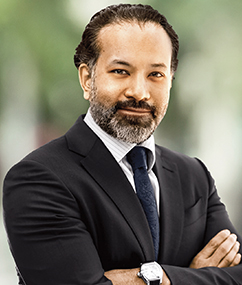How White & Case is helping the Middle East to tap capital markets
Regulatory changes affecting the lending abilities of international banks, a reduction in government deposits, and still-low oil prices have seen many in the Middle East turn to the capital markets to raise funds. This plays into the hands of law firm White & Case, which has a long-standing presence in the region, as Edward Russell-Walling reports.
Low oil prices and changing attitudes have made the Middle East the latest port of call for bank disintermediation. As regional borrowers get into the habit of tapping the capital markets, White & Case has featured regularly among their legal advisers.
The firm was founded in New York in 1901, but today has more lawyers outside the US than in it, stretching across Europe, the Middle East and Asia-Pacific. It has rock-solid Middle Eastern credentials, not least because what is now Saudi Aramco – the world's largest energy company – has been a client since 1952.
Indeed, White & Case is reported to have been appointed legal adviser to Saudi Aramco for its upcoming jumbo initial public offering (IPO). This values the business at up to $2000bn, according to Saudi's rulers, which would make it the biggest IPO ever. White & Case will not be drawn on the subject.
Internationally minded
Today, White & Case has a substantial Middle Eastern presence, with offices in Abu Dhabi, Cairo, Doha, Dubai and Riyadh, where it has an association with local law firm AlSalloum and AlToaimi. "Relative to our peers, we are one of the largest international law firms in the Middle East in terms of capital markets," says Debashis Dey, a Dubai-based partner at White & Case.
The global capital markets operation is headquartered in London, which has 15 dedicated partners and 40 associates. "They interact with capital markets lawyers on the ground across the office network," says London-based partner Ian Clark. "For deals in the Middle East we have significant capital markets resources."
It is an increasingly competitive market, in which the top teams need to make the most of their assets. "One of our strengths is that we have been in the Middle East for a long time," says Mr Dey. "I have been here for more than 10 years and a lot of senior associates have been here almost as long."
Another advantage for White & Case, and an unusual one, he says, is the firm's depth in US as well as English law. He acknowledges that certain competitors are good in local law and the UK's so-called magic circle firms are good in English law. "But they don't match us for US law," he adds.
A new focus
The focus on capital markets is new for the Middle East, which has always been a banking market, dominated by large state-owned lenders. As long as oil prices remained high, there was no pressure on governments to rationalise the way in which they raised funds. Plentiful dollar oil revenues could be deposited in banks and on-lent at a low cost of funds compared with the capital markets.
Now a number of things have changed. One is the level of international bank liquidity. "Regulatory changes mean that international banks can no longer come here and lend at incredibly low rates, because of cost of capital issues under Basel III," says Mr Dey. "So their lending has become more strategic."
Alongside this development, domestic banks are also lending less, because they have fewer government deposits. With lower oil revenues, governments are having to deploy their revenues in different ways to cover budget deficits. They are having to think about how they raise money both domestically and internationally, devolving budgeting and funding responsibilities on to some parastatals.
"One other significant factor has been a general change in political priorities in the region," says Mr Clark. "This has led to a reassessment of broader economic and social objectives."
The next generation
Saudi Arabia, as a leading example, has a new generation of leaders who want to move the country's economy in new directions, in order to reduce dependence on hydrocarbons. Achieving those goals, which include a bigger role for the private sector, will require more reliance on capital markets.
"They [and other regional governments] also need to increase international understanding of their markets, in order to open up new avenues of investment," says Mr Clark. "Saudi Arabia's first bond deal, for example, meant introducing Saudi Arabia and its vision to a broader international market."
While Qatar issued its first international bond in 2011, other Gulf Co-operation Council states have only caught up more recently. Saudi Arabia set the tone in October 2016 with an extraordinary $17.5bn debut sovereign bond sale, which attracted orders of $67bn. White & Case acted for the lead banks on the deal – JPMorgan, HSBC and Citi.
If international investors have had to get used to the region, the reverse has also been true. The markets have demanded a level of disclosure entirely alien to local governments – so much so that extracts from some deal prospectuses have been read out on local TV news.
"These documents must be prepared to international standards, so high standards of disclosure must be followed," says Mr Clark.
Sukuk option
Since sharia-compliant accounts were unable to buy the Saudi Arabian debut bond, it was followed up in April with the country's debut sukuk, on which White & Case was also legal adviser to the lead banks.
The firm helped with the sukuk's innovative mudaraba/murabaha structure, the first time a sovereign issuer has used the mudaraba principle. While Saudi Arabia’s government said it did not regard the sukuk as a securitisation, the prospectus included an asset-backed securities-related disclosure on credit risk requirements, as demanded by the US Dodd-Frank Act. That raised general fears that risk retention, as required by the US statute, could henceforth apply to sukuk in general.
White & Case pointed out at the time that "the majority of sukuk in the international markets are asset-based, making them dependent on the creditworthiness of the sponsor".
That did not get in the way of making this the biggest ever international sukuk. The $9bn dual-tranche Rule 144A/Reg S deal attracted more interest than any before it, with a final order book of $35.5bn.
Kuwait journey
Though White & Case does not have an office in Kuwait, it has advised on a number of recent issues originating there. Towards the end of 2016 it advised Equate Petrochemical (a joint venture between Dow Chemical and Kuwait's state-owned Petrochemical Industries Company) and the Kuwait Olefins Company on the establishment of their inaugural $4bn global medium-term note (GMTN) programme. Working with a local law firm, it also advised on the accompanying Rule 144A/Reg S issue of $2.25bn of notes. At the time, this was the largest international bond issue out of Kuwait.
This was partly a refinancing exercise following Equate's 2015 acquisition of ME Global, a petrochemical company, from Dow Chemical for $3.2bn. At the time it raised $6bn of bridge financing, before taking out a $5bn syndicated loan in June 2016.
The notes were actually issued by Equate's Dutch subsidiary. "Kuwait set up a new capital markets regulator in 2016, and one of the challenges was to understand how its new rules would impact the ability of a Kuwaiti company to raise debt through an international subsidiary," says Mr Dey.
White & Case was not involved in Kuwait's $8bn debut sovereign bond issue in March. In the same month, however, the firm again advised Equate on its inaugural $500m issue of 'trust certificates', the first international corporate sukuk out of Kuwait.
In May, the firm acted for the lead banks on a GMTN programme and the first Rule 144A/Reg S bond offering from a Middle Eastern financial institution since 2009. This was the $750m five-year inaugural issue from Kuwait's biggest bank, National Bank of Kuwait (NBK).
"NBK is one of the largest banks in the Middle East," says Mr Dey. "It had previously done regulatory capital issuance but not a bond programme, so this was a significant debut. It also wanted it done in five weeks, before the start of Ramadan."
If the deal did not get to market before the month-long season of fasting and religious observance, marketing in the Middle East would become a lot more challenging for all concerned. As it was, the deal was successfully launched with a few days to spare, tightening 25 basis points from initial thoughts to price at the tightest spread to sovereign in the Middle East and north Africa region.
There will doubtless be more to come. "With the contraction of credit available from banks, there will be continued demand for capital market financing from corporates in the region," predicts Mr Clark.




